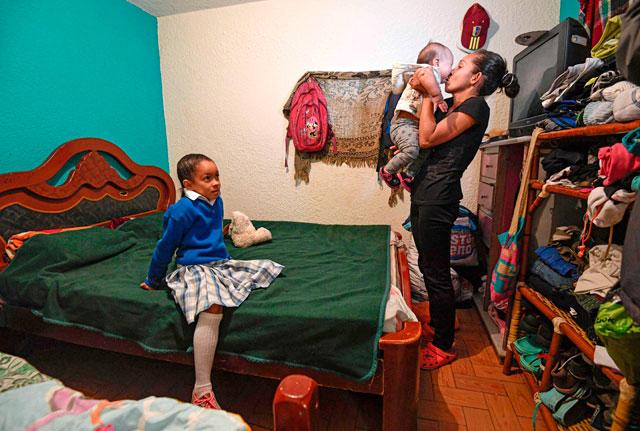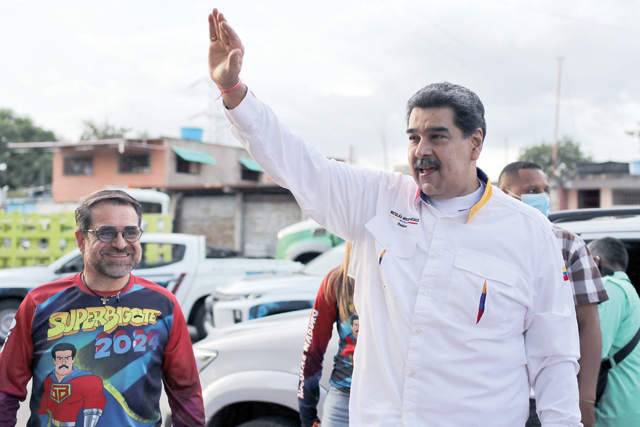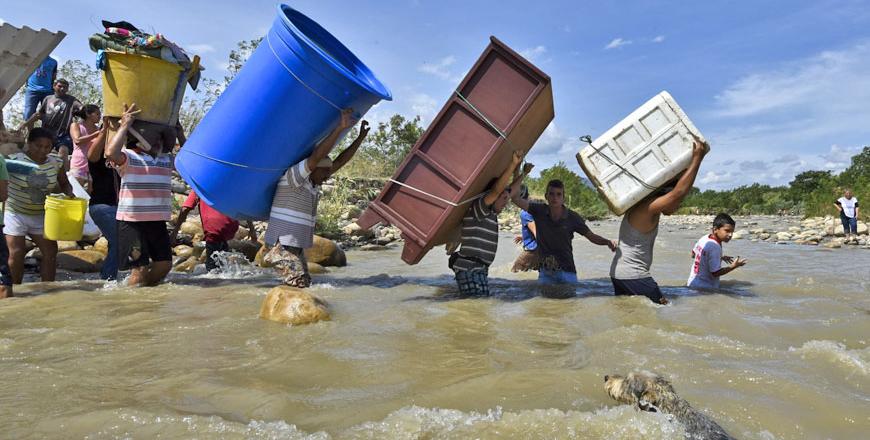You are here
Children of Venezuelan exodus trade one ordeal for another in Colombia
By AFP - Oct 12,2019 - Last updated at Oct 12,2019

Venezuelan Yisela Palencia holds her baby Wilbelys next to her oldest daughter during an interview in Bogota, on July 4 (AFP photo)
BOGOTA — Stateless baby Wilbelys officially "doesn't exist", Arianna is a six-year-old who's moved home seven times, Jazmin is missing school — the children of the Venezuelan exodus are trading one ordeal for another in neighbouring Colombia.
Migrants of all ages and social status are fleeing Venezuela's crippling economic crisis, unable to cope with hyperinflation and shortages of basic goods and medicines.
Well over a million have ended up in neighbouring Colombia, among them nearly 200,000 children. In reality, the figure is higher, migration officers say, because many entered the country illegally.
In other circumstances, living abroad could be any child's dream. But this generation is suffering "an immense grieving", according to Sandra Perdomo, director of the Zion foundation which provides assistance to at-risk children.
Most of them don't understand what's happening to them and worse, "they've lost all hope, they are no longer children".
Stateless
In the final two weeks of her pregnancy, Yisela Palencia crossed the border into Colombia illegally.
The hospitals in her own country, for all its previous oil wealth, lacks medicine and reliable hospital equipment.
So taking her other two children, aged eight and five, with her, Palencia headed to Colombia via the smuggling trails that criss-cross the border and rejoined her exiled husband in Bogota.
But the birth of Wilbelys did not bring the joy the couple had hoped for. A legal void has made the baby's first months a bureaucratic nightmare.
She is unable to benefit from her parent's nationality, because there is no Venezuelan consular service in Colombia. But she cannot have Colombian nationality either as Bogota does not recognise the right of citizenship through birth in the country.
"My daughter has no homeland. She is not recognised here in Colombia or Venezuela," said Palencia, 32. "Officially, she doesn't exist."
There are 24,000 children like Wilbelys in Colombia. President Ivan Duque signed a decree in August allowing them to benefit from Colombian nationality.
Palencia thought the problems were over for her daughter, who turned a year old in August, but the registry told her it her case could not be settled until December.
The United Nations has identified four million stateless persons in 78 countries around the world, who frequently suffer discrimination in accessing basic rights to healthcare and education.
"We don't get to decide where we are born and children have nothing to do with what happens," said her mother.
Homeless
Arianna Celis wears a different uniform to her classmates, one month after entering Augustin Fernandez School in northern Bogota.
Since leaving the Venezuelan city of Los Teques in 2014, she has moved seven times in Colombia as her father Carlos can only find short-term work as a butcher.
The shy little six-year-old only wants one thing. To stay in the same place.
"We don't know whether we are coming or going," said Maria Escalona, Arianna's mother. "If these changes continues as she grows, this will affect her."
At 39, Maria dreams of "providing stability, a little house, a quality of life", to her girls.
"That's the reason we came to Colombia," she said in the family home, which for now is a tiny apartment.
According to child psychologist Jhon Herrera, children like Arianna live with constant "grief" because of the material and cultural losses they experience as refugees. "They are even likely to suffer post-traumatic stress."
School-less
At 13, Jazmin Gonzalez has to kill time every day watching TV when she should be at school.
The secondary school near her home requested a health certificate to enroll her, which as an undocumented person she could not provide.
Colombia guarantees unrestricted access to education. But some institutions ignore the legislation when dealing with poor migrants who are unaware of their rights.
For her part, Jazmin would like to return to Venezuela because in Colombia "she has nothing to do".
Children "are not guilty over what is happening in Venezuela", said her mother, Elizabeth Gonzalez.
Perdomo, the expert from the Zion Foundation, says Venezuela's child migrants are suffering "great sadness".
According to Wilbelys' mother, Yisela Palencia: "They are losing their childhood."
Related Articles
BOGOTA — Leftist Venezuela has agreed to be a guarantor of future peace talks between Colombia and its last guerrilla group, both countries
CARTAGENA, Colombia — The foreign ministers of Colombia and Venezuela promised to jointly combat crime along the border following talks to c
BOGOTÁ — US Secretary of State Antony Blinken began his tour of Latin American countries on Monday in Colombia, where combatting drug traffi


















